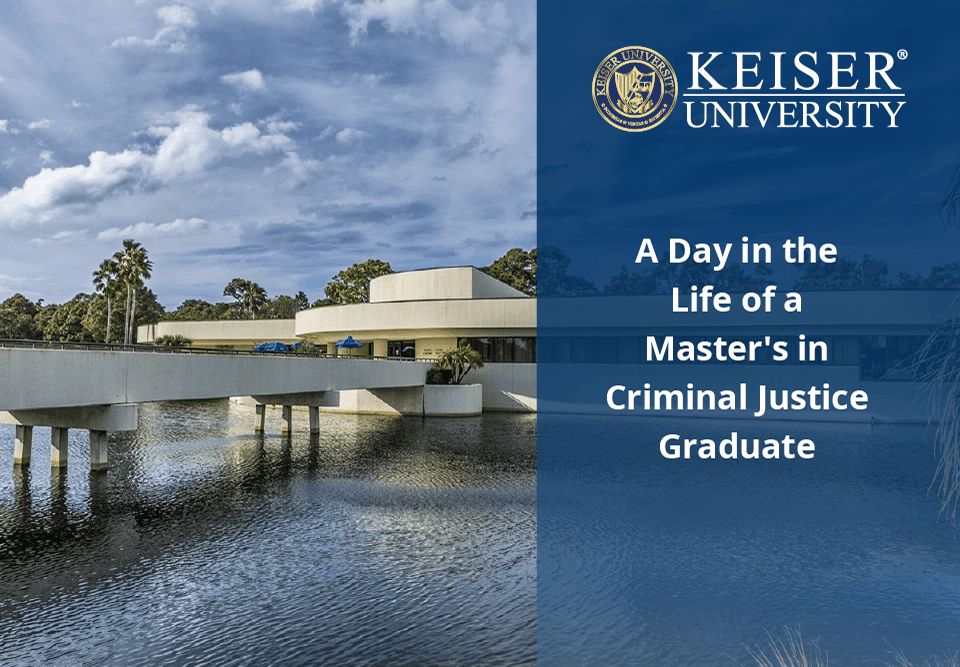Thinking about pursuing your master’s degree in criminal justice (MCJ)? Wondering what a day in the life of a graduate student or even a criminal justice grad will look like? No two graduates’ days will be identical, and there are plenty of exciting and rewarding career opportunities worth exploring as an MCJ grad.
Dive into the curriculum of a typical MCJ degree, some of the career paths you may be able to pursue with this designation, plus insights directly from a Keiser University criminal justice graduate.
What Is an MCJ Degree?
A master’s in criminal justice is a graduate-level degree that entails at least 30 credit hours and typically takes most students one to two years to complete. In addition, an MCJ tends to cover more specialized areas of the criminal justice field than an undergraduate degree alone — and often with a greater focus on developing research skills and understanding the inherent complexities of the criminal justice system.
Areas of Study and Skill Development
The objectives and areas of study in a master’s in criminal justice program can vary, too, especially if you are attending a program that offers specializations or concentrations. In general, however, an MCJ program aims to prepare students and graduates to:
- Pinpoint and analyze gaps in criminal justice services.
- Think critically about the safety needs of the communities in which they serve.
- Serve as criminal justice leaders in both the public and private sectors.
- Aid in holding criminals accountable and helping victims.
More specifically, students in a criminal justice program at the graduate level may complete coursework in essential areas of the field, such as:
- Criminology
- Conflict analysis and resolution
- Professionalism and ethics
- Policy analysis
- Juvenile justice
- Methods for research in criminal justice
Who Pursues an MCJ?
Anyone who meets admissions requirements can pursue a master’s in criminal justice — including those with undergraduate degrees in criminal justice, a related field or a different field entirely. Most frequently, an MCJ is pursued by those already working in criminal justice positions (such as law enforcement officers and corrections professionals) who want to advance their education and potentially move into more specialized areas of the field, like leadership or teaching roles.
For example, Keiser University graduate Julie Sims is an aspiring professor and single mom with two teen girls, working full time doing information tech, system maintenance and cybersecurity for a business. She completed the criminal justice master’s degree fully online, which allowed her more freedom between life obligations related to work and her kids. “The online-based program gave me the opportunity to live freely and accomplish my degree all at my own pace,” Sims says.
Is an MCJ Right for You?
No matter if you already have your undergraduate degree in criminal justice or a completely unrelated field, an advanced criminal justice degree may or may not be ideal for you. This is a highly personal decision to make for yourself after careful consideration. However, there are a few factors you can think about to ultimately help you make your choice.
Your Career Aspirations
Can you envision what you would want to do with your criminal justice degree? Some might dream of having a positive influence on policy development, whereas others may aspire to lead organizations or agencies. Perhaps you could see yourself conducting research on criminology or a related field rather than being part of direct practice. Either way, having some idea of how you would plan to apply your MCJ education can help determine if this path may be suited for you.
Aside from a general desire to learn more about the rights and regulations regarding crime, Sims says she would like to be a professor. With a passion for helping people, she finds the professor’s profession to be unique, allowing the freedom to focus on problems important to you. She expands:
“Teaching and mentoring can motivate the next generation of students. As a lecturer, you have the opportunity to be inspired by a community of enthusiastic and driven individuals. If you’re passionate about your studies, enjoy teaching and learning from others and want to be a part of a lively academic community, I think this is a great career choice. The professor has the most important impact on the students to comprehend the subject fully.”
Your Passion for Justice and System Improvement
Another key consideration is your own sense of passion and motivation to address certain systemic issues within the criminal justice realm. Like all fields, criminal justice faces its challenges that will rely on future generations of professionals to overcome. If you are committed and compelled to contribute to a more effective and equitable justice system, you could be an excellent addition to the field.
Your Background and Experience
To enroll in an MCJ program, you will need to have at least a bachelor’s degree from a recognized institution. Some schools may require that your undergraduate degree is in a related field or even that you possess a certain amount of foundational experience in criminal justice or a similar field. Be sure to check the admissions requirements of any program before you apply.
Program Research
Finding the MCJ program that is best for your own learning style and career goals can make all the difference. Ideally, you want to choose an MCJ program from an accredited school, as well as one with proven faculty experience and expertise. As you explore program options, review the curriculum of each to find one that will align well with your own specific goals.
Day in a Life of a MCJ Student
For Sims, her general routine involved waking up at 5 a.m. to get her kids ready and out the door before 6:30 — after which she would squeeze in a nap before getting ready for work. The key to balancing coursework, professional responsibilities and personal life during her master’s program came down to time management. This could mean finding time for homework during the workday, as she would arrive back home later in the evening — at which point she needed to cook, clean and take care of her family. She adds, “By this time, it’s around 11 p.m. I would start homework and studies, sometimes staying up till 1 or 2 a.m. depending on what was needed.”
With all the above in mind, you may wonder what a day in a life of a master’s in criminal justice graduate looks like. Below, you can explore three scenarios that can help you get a better feel for what to expect.
Scenario 1: A Day in the Life of an MCJ Graduate in Policy and Research
Many MCJ graduates go on to work in policy and research, contributing to the field by performing their own data analysis and helping agencies align their own strategies with the latest legislation and policies.
Morning: Data Analysis and Policy Review
To begin the day, an MCJ graduate in this area of the field may sit down at their desk to analyze the latest crime statistics, reviewing other justice-related research and evaluating the impact of recent legislation on crime rates. This part of the day might also include collaboration with fellow researchers or government agency teams to bring everyone up to speed on their current projects.
Mid-Day: Report Writing and Stakeholder Briefings
Throughout the rest of the morning into the afternoon, an MCJ graduate may work on such tasks as:
- Drafting comprehensive reports, policy briefs or white papers based on their independent research findings.
- Preparing for briefings or meetings with legislative aides, government officials and/or nonprofit leaders.
Afternoon: Advocacy and Future Strategy
To round out the day, an MCJ grad may participate in meetings with various advocacy groups. During these meetings, they might discuss criminal justice reform initiatives and brainstorm strategies for any future research projects and/or policy recommendations.
Scenario 2: A Day in the Life of an MCJ Graduate in Law Enforcement/Corrections Leadership
Meanwhile, many MCJ graduates may advance into leadership positions within law enforcement or corrections agencies.
Morning: Operational Oversight and Strategic Briefing
Upon arrival on the job, these professionals may set aside some time to review their daily operational reports, intelligence briefings and personnel assignments to get a better feel for what happened on a previous shift and where they stand moving forward. From there, they may also conduct strategic meetings with unit commanders or correctional facility wardens.
Mid-Day: Program Development and Staff Training
Next, leaders in law enforcement or corrections might work on developing new training programs for officers or correctional staff to ensure everybody is on the same page and following the same policies. These professionals may leverage their analytical thinking skills to evaluate the effectiveness of existing crime prevention or rehabilitation programs — making notes about future improvements and changes.
Afternoon: Community Engagement and Crisis Management
Toward the end of the workday, it is not uncommon to meet with community leaders or others in the field to address public safety concerns and work to build trust. In some cases, it may also be necessary to respond to or otherwise oversee the management of critical incidents or more complex investigations as they unfold.
Scenario 3: A Day in the Life of an MCJ Graduate in Program Management/Nonprofit
Another area of the field where many MCJ graduates land is in program management or nonprofit management, both of which can be rewarding roles with ample opportunities to make a difference.
Morning: Grant Writing and Funding Pursuit
A professional in program or nonprofit management may kick off the day by researching and drafting grant proposals in an effort to secure funding for various causes, including:
- Victim support services
- Re-entry programs
- Youth crime prevention initiatives
Mid-Day: Program Implementation and Client Engagement
These professionals may move on to another important area of their work: overseeing the day-to-day operations of criminal justice-related programs. This might include restorative justice programs, diversion programs or similar options. This work entails meeting with clients, volunteers and other partners in the community to ensure the effectiveness of these programs and noting any changes that need to be made.
Afternoon: Evaluation, Reporting and Outreach
By late afternoon, these professionals may move on to collecting and analyzing data to further evaluate program outcomes and prepare impact reports. This could also involve conducting any additional outreach to potential clients or collaborators before ultimately presenting program findings and successes to their stakeholders for further discussion and review.
Scenario 4: A Day in the Life of a Criminal Justice Lawyer
Disclaimer: This scenario is intended for informational purposes only and does not imply that a degree in criminal justice qualifies you to practice law. Becoming a criminal lawyer requires a law degree (JD) and passing the bar exam. This example is included to provide context for the broader criminal justice system and related careers.
As one final example, being a criminal lawyer makes for a fast-paced and mentally demanding yet purpose-driven career that calls for strong ethics, resilience and critical thinking.
Morning
A day in the life of a criminal justice lawyer often starts early with case preparation, including reviewing files, organizing evidence and strategizing arguments for court. Morning hours might involve client meetings or courtroom appearances for arraignments, bail hearings or trial proceedings.
Mid-Day
Mid-day is typically spent conferring with law enforcement, negotiating with prosecutors or preparing legal documents (such as motions and briefs).
Late-Day
The afternoon may include courtroom advocacy, whether representing clients in trial or engaging in plea negotiations. After hours, these professionals often return to their desks to review new case details, conduct legal research and ensure all filings and deadlines are on track.
Ready to Advance Your Education?
While this is by no means a comprehensive list of everything you could do with an MCJ degree, hopefully it does help provide a clearer picture of what it can be like to work in the field with this type of degree. Whether you envision yourself thriving as a federal agent, probation officer manager, corrections director or in any role in between, having your master’s in criminal justice gives you the opportunity to put your research, problem-solving and analytical skills to use to make a difference in the lives of others.
Reflections on the Journey From a Criminal Justice Grad
Throughout her studies, Sims credits Dr. Gregory Vecchi with making the most lasting impression and impact. “He helped me a lot and was not hard to talk to; he made you feel comfortable,” she notes. “I fell off sometimes, and he was there to understand and assist me in completing my papers and work. He was stern and straightforward, but when you needed something, all you had to do was talk to him.”
In terms of final words and advice for graduate students, Sims explains how you can find great personal satisfaction and pride in helping your community (and country) through criminal justice — working to protect innocent people from harm while assisting those suffering from trauma or through catastrophe.
“It’s not about making a profit or meeting business goals. It’s not about working for others,” Sims says. “On this route, you strive to make a positive contribution to the world around you. That frequently entails being the best version of yourself while also helping, protecting or guiding others.”
And, regarding the program coursework, she adds: “Get ready for a lot of writing!”
When it comes to choosing the right MCJ degree program, take your time researching options, as not all programs are created equal. At Keiser University, our Master of Arts in Criminal Justice program, which is offered both online and on campus, explores every aspect of the criminal justice system to prepare graduates for the challenges and opportunities of this dynamic field. Plus, with our “Students First” policy, we ensure you are supported through every step of the program.
We offer related degrees, too — including an MCJ in Interdisciplinary Studies, a Doctor of Criminal Justice (DCJ) and a PhD in Criminal Justice and Criminology.
Reach out to speak to a graduate admissions counselor about any of our programs, or take the next step by completing an online application.






 The instructors at Keiser University impacted my life. They believed in my ability to become a great graphic designer, regardless of how I felt about my skills. KU helped to prepare me for the real world and got me to where I am today.
The instructors at Keiser University impacted my life. They believed in my ability to become a great graphic designer, regardless of how I felt about my skills. KU helped to prepare me for the real world and got me to where I am today.
